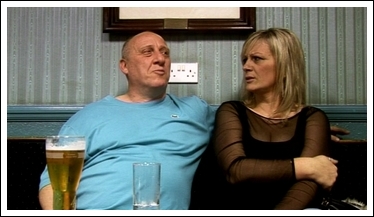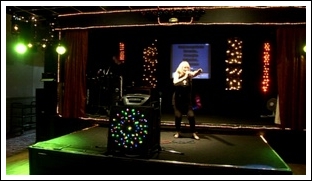New Members Welcome!
New Members Welcome! Sussex University Students film down their Local Social
Who says that young people don’t care about clubs? Don’t care about the local community and older people? We have found just the opposite to be the case here on Club Historians, several times over.
A few months back, Ruth received an email from Jackson Ducasse, a final year Film student at Sussex University. He and a few of his fellow students wanted to make a film about their local club, the Brighton Trades Labour Club and wanted a bit of background information about the club movement. She was impressed by his concern and interest and helped to fill out a bit of the club movement’s history and current state of decline.
Jackson had first thought of the idea of making a documentary about what went on in the local club even though he had scant experience of club life. He told me:
The idea for ‘New Members Welcome’ was formed during daily bus journeys along Elm Grove and Lewes Road, Brighton. As a young person neither personally nor professionally involved in industry, I had only a limited understanding of what a working men’s club was actually like. This lack of knowledge gave me a distinct curiosity of what the lifestyle of a club member would be like. Having witnessed only momentary snapshots of club life, mainly gained from the sight of club members chatting and smoking outside the entrance to the Lewes road and Elm Grove clubs, my curiosity only grew. .
I recall one day passing the Elm Grove club and noticing a piece of hand written graffiti which read ‘Labour has failed us all’ – I believe it was this small protest which really sparked my desire to get to know the club and its members. I began to wonder what sort of people inhabited these ‘run-down’ looking places, what sort of experiences they had lived through, how they imagined the state of Brighton today and by extension what views they had of contemporary Britain. As an idea for a film I had a gut instinct that the club members would be interesting and lively ‘characters’ and that the story of the club might be able to act as a reminder of what has happened to the parts of British society that are deemed unfashionable by the mainstream media. I also believe that deep down I had a  personal desire to be accepted in a group that, as an outsider looking in, appeared to be quite isolated from mainstream society. The need and desire to belong in ones immediate environment and community is a concept that, with the rise of individualistic culture, seems to have lost some power particularly amongst the younger generation. I believe that is important for the younger members of society to engage with their local communities and take greater pride in what is closest to home.
personal desire to be accepted in a group that, as an outsider looking in, appeared to be quite isolated from mainstream society. The need and desire to belong in ones immediate environment and community is a concept that, with the rise of individualistic culture, seems to have lost some power particularly amongst the younger generation. I believe that is important for the younger members of society to engage with their local communities and take greater pride in what is closest to home.
Hear hear! These words express sentiments that are at the base of Club Historians. I asked him about how he found the process of getting involved with the club.
Once I had contacted the club Secretary and relevant committee members at the Brighton Trades Labour Club, I was pleasantly surprised by how open they were to the idea of making a film about the club. Once the project had been given the green light by the committee it became a question of finding the right participants for the film. I was looking for a variety of club members, young and old, male and female, committee and non-committee members, people who would provide an engaging and balanced (though not overtly ‘objective’) viewpoint of their club experiences. In order to find the right people and to gain the trust of the club’s members, many of whom were elderly or for one reason or another were distrusting of outsiders and the media, this stage proved to be fairly difficult. My film-crew and I made a number of trips to the club without our cameras so that we could get to know people – discuss our intentions for the film and prove to them that we were sincerely interested in their lives. One thing that we noticed was, despite some initial doubts, the club members showed genuine hospitality and a sincere interest in what we were doing. There was never an occasion when we were made to feel unwelcome.
We were often offered drinks, asked to take part in various games (bingo, karaoke etc.) and on many occasions club members would point us in the direction of somebody who would be able to give us information for the film. There were some times when tensions were raised, particularly with  committee members. Disagreements tended to arise between committee members about how best to ‘use’ us, the film-crew, to the best advantage of the club. We were declined the opportunity to film committee meetings and potentially sensitive information regarding club accounts was kept strictly off-limits. Although I felt that it would have been an amazing opportunity to film the committee meetings, I knew we should respect the wishes of those in charge of the club. Maintaining a positive atmosphere between film-crew and club members was beneficial to the overall dynamic of the filmmaking conditions.
committee members. Disagreements tended to arise between committee members about how best to ‘use’ us, the film-crew, to the best advantage of the club. We were declined the opportunity to film committee meetings and potentially sensitive information regarding club accounts was kept strictly off-limits. Although I felt that it would have been an amazing opportunity to film the committee meetings, I knew we should respect the wishes of those in charge of the club. Maintaining a positive atmosphere between film-crew and club members was beneficial to the overall dynamic of the filmmaking conditions.
Jackson hits upon a tricky issue here about how to deal respectfully with clubs and their management committees yet try to show the whole picture of club life, especially in these hard times when many clubs are struggling financially. Clearly Jackson and his film crew of fellow students experienced from Day One the warmth and hospitality of club life, with people willing to buy them drinks even though I guess they didn’t have much spare money.
New Members Welcome is a wonderful tribute to the Brighton club and its members as they struggle to keep the club open. It is informative, interesting, funny yet extremely poignant such as when we see the auction which raised money for the roof repairs and the shot of the big bottle of coins on the club bar. (We all recognise that way of collecting money!)
 |
We hope to have excerpts from the film uploaded onto Club Historians in the near future, so watch this space!
Many thanks to Jackson and his team not only for making this great film and piece of documentary evidence of modern club life, but also for just caring in the first place.
We wish them every success!
If you would like a copy of the film then Jackson has some available, at the cost of £5(+ P&P). Please note that the money will go to the club (£1 will go towards the unit cost of the DVD and packaging)
Contact him on - jackson.ducasse@hotmail.co.uk
